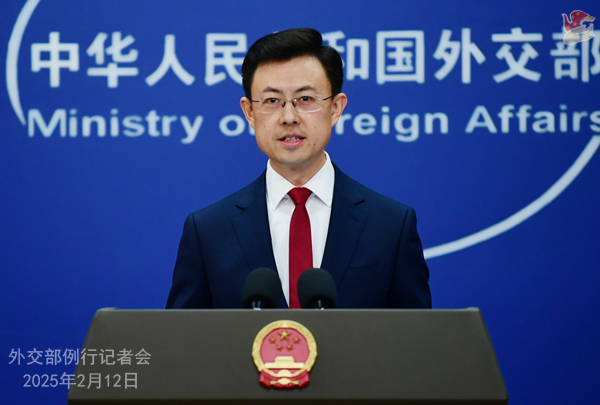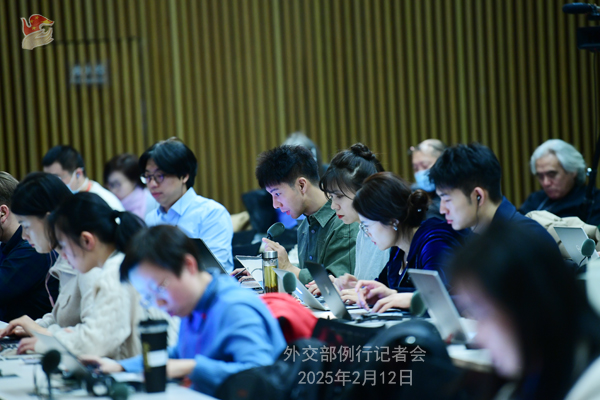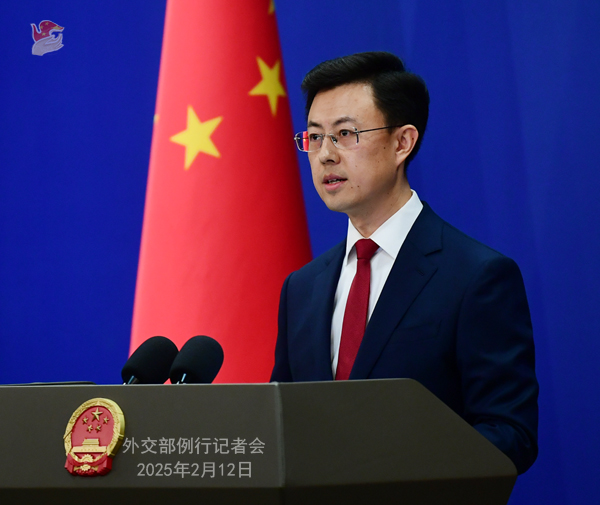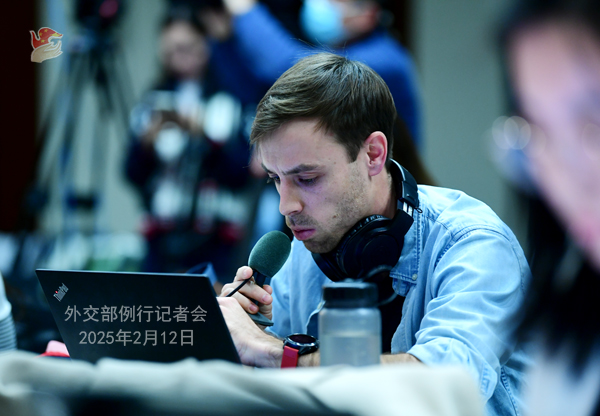
Shenzhen TV: Competent department announced a visa-free policy for tourist groups from ASEAN countries visiting Xishuangbanna in Yunnan, which took effect from February 10. Figures show that China received more than 3.43 million inbound tourists from 175 countries and regions during the Spring Festival holiday this year, up by 6.2 percent year-on-year. Commentators attributed the phenomenon to the policies that China has rolled out to facilitate cross-border travel. What’s your comment and does China plan to introduce more steps to promote inbound travel?
Guo Jiakun: Today is the Chinese traditional festival—the Lantern Festival, and I want to wish all of you and your family happiness, great health and auspiciousness. Having first-hand experience of folk custom in China seems to have become quite trendy during this year’s Spring Festival, and the Chinese people welcomed foreign visitors with warm hospitality. Top destinations in China have enabled foreign tourists to make mobile payments smoothly and conveniently. Latest data show that during the Spring Festival holiday, the total number of transactions made by international tourists that were processed by China UnionPay and NetsUnion Clearing Corporation increased by 124.54 percent year-on-year, and the total transaction value grew by 90.49 percent. Localities and departments in China also rolled out facilitating measures in the cultural and tourism sector in an effort to support the visa-free policies, such as higher clearance efficiency, more convenient language services, better accommodation, catering, sightseeing and other services throughout the travelers’ journey, and the pilot “Buy Now, Refund Now” service for efficient departure tax refunds. From online services to brick-and-mortar stores, from customs counter to store counter, the smooth travel experience everywhere and anytime in China has made foreigners feel like home, and helped them see an open, confident, culturally advanced, and safe and secure China.
The latest policies, including the 110-plus steps in facilitating cross-border travel, unilateral visa-free policy for 38 countries and the 240-hour visa-free transit, speak to China’s firm commitment to high-standard opening up, and serve as China’s concrete steps in building an open world economy. Going forward, China will continue its effort of improving inbound travel policies and putting more countries on the visa-free list, and present a credible, amiable and respectable image of China to foreign friends.
CCTV: Recently, President Xi Jinping’s special representative, Member of the Political Bureau of the CPC Central Committee and Vice Premier of the State Council Zhang Guoqing attended the Artificial Intelligence Action Summit in France. The meeting published the Statement on Inclusive and Sustainable Artificial Intelligence for People and the Planet. Could you share more information with us?
Guo Jiakun: From February 10 to 11, President Xi Jinping’s special representative, Member of the Political Bureau of the CPC Central Committee and Vice Premier of the State Council Zhang Guoqing attended the Artificial Intelligence Action Summit in Paris. In his address, Vice Premier Zhang stressed that President Xi Jinping put forward the Global Initiative for AI Governance, which contributed China’s solution and wisdom for the major question of our times. The international community should work together to advocate the principle of AI for good, deepen cooperation on innovation, strengthen the inclusive development of AI for the benefit of all, improve global governance and jointly build a community with a shared future for mankind.
Participants praised China’s progress and principles of governance on AI, and major initiatives and measures on international AI cooperation. The Summit released an outcome document entitled the Statement on Inclusive and Sustainable Artificial Intelligence for People and the Planet and spoke highly of China’s effort in advancing the adoption of the resolution entitled “Enhancing International Cooperation on Capacity-building of Artificial Intelligence” at the UN General Assembly and mentioned the 2025 World AI Conference to be hosted by China as an AI milestone. China’s signing of the outcome document of the summit shows our positive attitude toward promoting development and global governance of AI. China will continue to follow the principle of wide consultation, joint contribution and shared benefits to step up exchanges and cooperation with various parties, and develop AI for global development and the good of humanity.
AFP: A follow-up on the AI summit. US Vice President JD Vance said at the summit that “authoritarian regimes” were using AI to control their citizens and also subsidizing cheap tech for export. The U.S. also didn’t sign the summit’s joint statement. Does China have a response to those comments and to the U.S. position at the summit?
Guo Jiakun: I shared information about the Chinese delegation attending the Artificial Intelligence Action Summit just now. On AI cooperation, we stressed more than once that China is embracing the AI transformation and is working hard to advance AI. We take the safety and security of AI seriously, and support entrepreneurial innovation by Chinese companies. China is also an advocate of inclusive AI. We have helped developing countries enhance capacity building, advocating that AI technologies should be open-sourced and there should be greater accessibility to AI services. That said, we are against drawing lines along ideological difference, overstretching the concept of national security, or politicizing trade and tech issues.
Rudaw Media Network: U.S. President Donald Trump continues to say that he will relocate Palestinians in Gaza and will not let them return to their enclave. How is China going to stop Trump from doing so since it’s a violation of international law? How do you think Chinese tit-for-tat for Trump tariffs are going to impact America?
Guo Jiakun: On your first question, Gaza belongs to the Palestinian people. It is an inalienable part of the territory of Palestine. China firmly supports the legitimate national rights of the Palestinian people, believes that “the Palestinians governing Palestine” is an important principle that must be upheld in the post-conflict governance of Gaza, and opposes the forced displacement of the people of Gaza. Under the current circumstances, the international community, major countries in particular, needs to play a constructive role in implementing the ceasefire deal, and promoting the delivery of humanitarian aid to Gaza and reconstruction there.
On your second question, protectionism leads nowhere, and trade and tariff wars have no winners. This has been widely recognized in the international community. What the U.S. did severely violates the WTO rules, harms the rules-based multilateral trading system, and does no good to solving its own problems.

Hubei Media Group: According to recent U.S. media reports, the U.S. Agency for International Development used U.S. taxpayers’ money to fund gain-of-function studies at China’s Wuhan Institute of Virology, which may have caused the COVID-19 pandemic, leading to the deaths of millions around the world. What is China’s comment?
Guo Jiakun: China has repeatedly stated its position on the origins-tracing of COVID-19. Origins-tracing is a matter of science and any judgment on it should be made in a science-based spirit and by scientists. It is “extremely unlikely” that the pandemic was caused by a lab leak—this is the authoritative conclusion reached by the experts of the WHO-China joint mission based on science following their field trips to the lab in Wuhan and in-depth communication with researchers. The conclusion has been widely acknowledged by the international community, including the science community.
China has also made it clear more than once that the Wuhan Institute of Virology has never engaged in gain-of-function studies of coronavirus. Never has it designed, made or leaked COVID-19. On the origins-tracing of the virus, China firmly opposes all forms of political manipulation. The U.S. needs to take a hard look at itself, rather than shirk responsibilities to others.
CCTV: Recently Philippine leader said that he doesn’t understand China’s comments on the missile system in the Philippines. He said, “we don’t make any comments on their missile systems and their missile systems are a thousand times more powerful than what we have.” He also offered to remove the Typhon missile system deployed by the U.S. military from his country if China ceases its “aggressive and coercive behaviour” in the South China Sea. Philippine Defense Secretary Gilberto Teodoro says that the Philippines plans to acquire its own midrange system, and they have the right to field these deterrent capabilities. What is China’s comment?
Guo Jiakun: Regarding the U.S. deployment of Mid-Range Capability (MRC) missile system in the Philippines, China has made clear the grave harm of such deployment and stated our firm opposition to it on multiple occasions. On this issue, the Philippines has gone back on its words again and again.
The Philippines has explained itself multiple times regarding the introduction of the Typhon system, pledging that the deployment was “temporary,” and that the system will be shipped out of the country after relevant military exercises. However, it has breached such commitments, claiming they would acquire its own midrange system and field these deterrent capabilities, and linking the South China Sea issue with the Typhon system. This is not only ridiculous but also extremely dangerous.
As is widely known, Typhon MRC missile system is a strategic offensive weapon, which puts a large number of Southeast Asian countries within its range. The U.S. deployment of the system in the Philippines severely disrupts peace and stability in the region, and harms the legitimate security interests of other countries. The Philippines has worked with the U.S. to bring in the Typhon system. It’s placing its national security and defense in the hands of others and introducing geopolitical confrontation and risk of arms race into the region, which does no one good.
China will not sit idly by when its security interests are harmed or threatened. Countries in the region will by no means accept this move that goes against the trend of the times. We call on the Philippines to change its course, and make a strategic choice that truly serves the fundamental interest of itself and its people, rather than staying on the wrong path and hurting the Philippines itself when it comes to issues like Typhon.
AFP: Two U.S. ships sailed through the Taiwan Strait this week, which was the first transit there since Donald Trump’s inauguration. Does the Foreign Ministry have a comment on this?
Guo Jiakun: The PLA Eastern Theater Command has made a response.
Let me stress that Taiwan is an inalienable part of China’s territory. The Taiwan question has nothing to do with freedom of navigation but bears on China’s sovereignty and territorial integrity. China firmly opposes any country challenging or threatening China’s sovereignty and security under the pretext of freedom of navigation.
Bloomberg: Philippine leader complained about China during a campaign for his Senate candidates today. He said none of the candidates were applauding China or cheering when their nation’s coast guard vessels were hit by water cannons from Chinese coast guard vessels in the South China Sea. Would the ministry like to comment on Marcos’s remarks?
Guo Jiakun: Let me respond by adapting his sentence: none of the Chinese people would refrain from a lawful and legitimate response, doing nothing when China is hit by infringement and provocation from the Philippines. China opposes exploiting the South China Sea issue for political manipulation.

Kyodo News: It’s reported that the Japanese Defense Minister and the U.S. Defense Secretary will hold talks in Japan in late March, during which they will talk about the Taiwan question. Will this affect Foreign Minister Wang Yi’s plan to visit Japan?
Guo Jiakun: The recent U.S.-Japan Joint Leaders’ Statement contains irresponsible remarks on issues relating to Taiwan, which interfered in China’s internal affairs. China has made serious protests to the U.S. and Japan to express our strong opposition.
The Taiwan question is purely China’s internal affair and is at the core of China’s core interests, which brooks no external interference. Both the U.S. and Japanese governments have made serious commitments to China on the Taiwan question. In particular, Japan bears serious historical responsibilities for its aggression against Taiwan and colonial rule over the island, and should all the more act prudently on the Taiwan question. We urge the U.S. and Japan to abide by the one-China principle and their own commitments, stop interfering in China’s internal affairs at once, and stop manipulating China-related issues.
On the specific visit you mentioned, I have no information to share.
NBC: There is another historical sensation from China after DeepSeek. This time the movie Nezha 2 will be screening in the North American market and more higher expectations also reported in other foreign markets after shattering box office record USD 1.2 billion, the first non-Hollywood movie apparently that has done so. So in the global context, what is the significance of this?
Guo Jiakun: For Chinese cinema, this year’s Spring Festival box office has indeed been witnessing new record highs. Multiple Chinese films are shown at home and abroad simultaneously. Some of them even topped the local non-English film box office chart. Those Chinese big hits are becoming new bridges for cultural exchanges between China and the world and a new window on China for the world. The fundamental reason behind this is that there is a strong desire among the people of China and other countries for economic, trade and cultural exchange and sharing of opinions. It also shows that in the process of globalization, all countries can realize development in an open and win-win environment.
Let me also stress that in a world where countries share an interconnected future, cultural exchange and mutual learning is increasingly becoming a bridge for friendship, a driving force of human progress and a bond holding together world peace. China will continue working with the rest of the world for better implementation of the Global Civilization Initiative, more inter-civilization dialogue and mutual learning, and contribution to global cultural diversity.
Bloomberg: The Trump administration has started referring to the Gulf of America rather than the Gulf of Mexico. Does China have any view of this change? Will China refer to this body of water as the Gulf of America in the future?
Guo Jiakun: We noted the report and the response of relevant country as well. It is China’s consistent position to oppose hegemonic, domineering and bullying practices in international relations.
AFP: Just wondered if you could give us any more information on the visit by the Prime Minister of the Cook Islands and the potential signing of the comprehensive strategic partnership agreement.
Guo Jiakun: I’ve answered the question several times this week. We will release information in due course. Please stay tuned.
